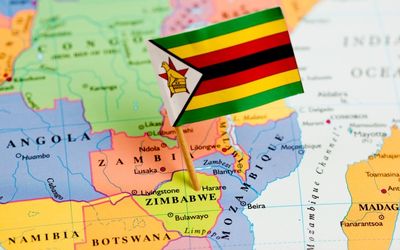Zimbabwe takes tough stance on indigenisation
by Memory Mataranyika and Malcom Sharara,
2016-03-25 10:14:18.0
HARARE — Foreign companies in Zimbabwe — among them South African firms such as Tongaat Hulett, PPC, Standard Bank, Impala Platinum and Aquarius Platinum — have mostly failed to comply with Zimbabwe’s indigenisation policy, Youth, Indigenisation and Economic Empowerment Minister Patrick Zhuwao said on Wednesday.
Zimbabwe’s indigenisation policy requires that foreign companies in Zimbabwe transfer majority shareholding into the hands of black citizens.
"It is 23 March 2016, three months into 2016 and businesses have continued to disregard Zimbabwe’s indigenisation laws. Cabinet has directed that on April 1 2016, all line ministers invoke Section 5 of the Indigenisation and Economic Empowerment Act against all non-compliant businesses in their sector," Mr Zhuwao said in Harare.
He said invoking the act was a technical process which would come into effect by "pure operation of the law".
Under the process, the minister of the sector in question would issue an order to a licensing authority to cancel licences of non-compliant businesses, notifying these firms in writing of the intention to cancel the licence.
Each company is allowed to give reasons why the licence should not be cancelled. The minister will then direct the non-compliant businesses to toe the line. If this does not happen, the minister will notify third parties likely to be affected by cancellation of the licence. The licensing authority will, without notice, cancel the licence if a business remains non-compliant after a grace period of 30 days.
Despite having some powers to enforce the legislation whittled down from his ministry, Mr Zhuwao said he is primed for the task at hand: enforcing compliance with the law.
He said he has assumed the role of ‘sheriff reloaded’ in enforcing compliance with the policy, taking his cue from former empowerment minister Saviour Kasukuwere who railroaded Implats, Aquarius Platinum and Anglo American Platinum into signing indigenisation deals for their units in the country.
"Those indigenisation deals gave the government a raw deal and those foreign companies got the better of then indigenisation minister, Kasukuwere. Right now fresh negotiations are taking place as those agreements have to be reviewed because we cannot pay for the shares they are transferring when they are mining our minerals," said a government official on Wednesday.
’Sheriff reloaded’ says it’s high noon
While Mr Kasukuwere called himself the Mike Tyson of foreign companies in Zimbabwe, Mr Zhuwao says he is now ‘sheriff reloaded’.
"I forgot to tell you I changed. It’s now sheriff reloaded. It’s no longer the new sheriff in town but sheriff reloaded," Mr Zhuwao said on Wednesday. On being appointed to head the empowerment ministry, Mr Zhuwao said he was the new sheriff in town for the foreign companies.
But unlike Mr Kasukuwere, who appeared to have all the powers to enforce the policy vested largely in his ministry, Mr Zhuwao has to count on the line ministries to approve cancellation of licences for foreign companies deemed unwilling to comply.
"There have been fewer companies that have heeded the March 31 deadline to submit empowerment plans. It will be a sad day to have to close those companies and this may prevent difficulties between the indigenisation minister and other line ministers who will not be too happy to see companies under their supervision closed," said another source in Zimbabwe.
It is the line minister who will have to decide if the cause for non-compliance is just or not, a legal expert said. Mr Zhuwao said non-compliant companies will be booted out of Zimbabwe and their companies taken over by new investors. This is despite a continued decline in fresh investments in the country, at a time when other companies such as Rio Tinto have had to leave the Zimbabwe.
Said Mr Zhuwao: "The failure to adhere to the laws of the land must attract immediate consequences that must be severe and dire enough to ensure that the law is respected and adhered to."
Fin24

Picture: THINKSTOCK
HARARE — Foreign companies in Zimbabwe — among them South African firms such as Tongaat Hulett, PPC, Standard Bank, Impala Platinum and Aquarius Platinum — have mostly failed to comply with Zimbabwe’s indigenisation policy, Youth, Indigenisation and Economic Empowerment Minister Patrick Zhuwao said on Wednesday.
Zimbabwe’s indigenisation policy requires that foreign companies in Zimbabwe transfer majority shareholding into the hands of black citizens.
"It is 23 March 2016, three months into 2016 and businesses have continued to disregard Zimbabwe’s indigenisation laws. Cabinet has directed that on April 1 2016, all line ministers invoke Section 5 of the Indigenisation and Economic Empowerment Act against all non-compliant businesses in their sector," Mr Zhuwao said in Harare.
He said invoking the act was a technical process which would come into effect by "pure operation of the law".
Under the process, the minister of the sector in question would issue an order to a licensing authority to cancel licences of non-compliant businesses, notifying these firms in writing of the intention to cancel the licence.
Each company is allowed to give reasons why the licence should not be cancelled. The minister will then direct the non-compliant businesses to toe the line. If this does not happen, the minister will notify third parties likely to be affected by cancellation of the licence. The licensing authority will, without notice, cancel the licence if a business remains non-compliant after a grace period of 30 days.
Despite having some powers to enforce the legislation whittled down from his ministry, Mr Zhuwao said he is primed for the task at hand: enforcing compliance with the law.
He said he has assumed the role of ‘sheriff reloaded’ in enforcing compliance with the policy, taking his cue from former empowerment minister Saviour Kasukuwere who railroaded Implats, Aquarius Platinum and Anglo American Platinum into signing indigenisation deals for their units in the country.
"Those indigenisation deals gave the government a raw deal and those foreign companies got the better of then indigenisation minister, Kasukuwere. Right now fresh negotiations are taking place as those agreements have to be reviewed because we cannot pay for the shares they are transferring when they are mining our minerals," said a government official on Wednesday.
’Sheriff reloaded’ says it’s high noon
While Mr Kasukuwere called himself the Mike Tyson of foreign companies in Zimbabwe, Mr Zhuwao says he is now ‘sheriff reloaded’.
"I forgot to tell you I changed. It’s now sheriff reloaded. It’s no longer the new sheriff in town but sheriff reloaded," Mr Zhuwao said on Wednesday. On being appointed to head the empowerment ministry, Mr Zhuwao said he was the new sheriff in town for the foreign companies.
But unlike Mr Kasukuwere, who appeared to have all the powers to enforce the policy vested largely in his ministry, Mr Zhuwao has to count on the line ministries to approve cancellation of licences for foreign companies deemed unwilling to comply.
"There have been fewer companies that have heeded the March 31 deadline to submit empowerment plans. It will be a sad day to have to close those companies and this may prevent difficulties between the indigenisation minister and other line ministers who will not be too happy to see companies under their supervision closed," said another source in Zimbabwe.
It is the line minister who will have to decide if the cause for non-compliance is just or not, a legal expert said. Mr Zhuwao said non-compliant companies will be booted out of Zimbabwe and their companies taken over by new investors. This is despite a continued decline in fresh investments in the country, at a time when other companies such as Rio Tinto have had to leave the Zimbabwe.
Said Mr Zhuwao: "The failure to adhere to the laws of the land must attract immediate consequences that must be severe and dire enough to ensure that the law is respected and adhered to."
Fin24



















Change: -0.47%
Change: -0.57%
Change: -1.76%
Change: -0.34%
Change: 0.02%
Data supplied by Profile Data
Change: -1.49%
Change: 0.08%
Change: -0.47%
Change: 0.00%
Change: -0.04%
Data supplied by Profile Data
Change: -0.34%
Change: 0.03%
Change: -0.10%
Change: -0.22%
Change: -0.69%
Data supplied by Profile Data
Change: -0.28%
Change: -1.15%
Change: -0.07%
Change: -1.21%
Change: -0.22%
Data supplied by Profile Data